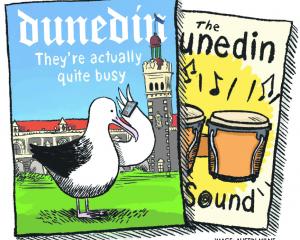
Sydney-based Fairfax is pursuing a $A2.2 billion deal with Nine Entertainment Co where the television company will effectively take over the publisher in Australia's biggest media consolidation since rules were changed allowing the ownership of print, TV and radio assets.
That deal did not place much emphasis on the opportunities provided by the New Zealand division, Stuff, which again had the value of its intangible assets slashed.
Fairfax cut $A60.5 million from the value of Stuff's licences, mastheads and trade names - including the Sunday Star-Times, Dominion Post and Press newspapers - to $A39.8 million.
Those assets were valued at $NZ1.12 billion in 2003 when the formerly Australian family-owned media group bought the Kiwi business from Rupert Murdoch's Independent Newspapers Ltd.
"The New Zealand media business is facing similar structural print revenue declines as Australia," Fairfax said in its annual report. "Digital revenue is expected to grow, albeit from a smaller base, which doesn't mitigate or offset print revenue declines."
Stuff's earnings before interest, tax, depreciation and amortisation shrank 27% to $NZ40.5 million in the year ended June. Revenue fell 7.5% to $NZ301.4 million.
Earnings were squeezed by a $NZ3.4 million provision as the media group reassessed its Holidays Act liabilities and invested $NZ2.6 million in the Stuff Fibre telecommunications retail service provider.
The New Zealand unit also bore the brunt of restructuring costs in a year when it sold or closed a third of its unprofitable community and regional publications. It accounted for $A16.2 million of the group's $A36 million of annual restructuring and redundancy charges.
Stuff's digital revenue climbed 21 % to $NZ47.8 million, driven largely by Stuff Fibre and Neighbourly. Fairfax attributed the growth to greater use of those services by its existing 2.1 million online audience. Other revenue gained 14 % to $NZ17.6 million.
"The pain of restructuring efforts will prove to be worth it as the benefits start to flow in future years and bring forward the time when increases in digital revenue will outweigh declines in print," chief executive Greg Hywood said in the annual report.
That will take some time, with Stuff's print advertising revenue sliding 17 % to $NZ140.8 million. Print subscriptions were also down 5.9 % to $NZ95.2 million. At the current rate of decline in print advertising and subscriptions - about 13% - it will be five more years before digital and other revenue surpasses that income provided the new income streams can maintain a 19% growth rate.
Other experiments include the 49% stake Stuff has taken in start-up power retailer energyclubnz - which takes long-term contracts with Vector and delivers electricity to its members 'at cost'.
Fairfax hasn't given up hope the New Zealand Court of Appeal will overturn decisions blocking a planned merger of Stuff with Kiwi rival, NZME.
Hywood noted the NZ division's strong digital assets put it in the box seat to participate in any domestic media consolidation. A tie-up with free-to-air TV and radio operator MediaWorks has been mooted as an option if Stuff is carved out in the Nine deal.
The New Zealand division's performance lagged behind a 1.2% increase in group ebitda to $A274.2 million, despite a 3.1% revenue decline to $A1.69 billion.
The company reported a net loss of $A53.6 million, due to $A175.9 million of impairments on the Stuff and Australian community divisions. The board declared a final dividend of 1.8 Australian cents per share, payable on September 6.
The ASX-listed shares fell 3.1% to 86.25 Australian cents, having gained 14% so far this year.
- By Paul McBeth of BusinessDesk













